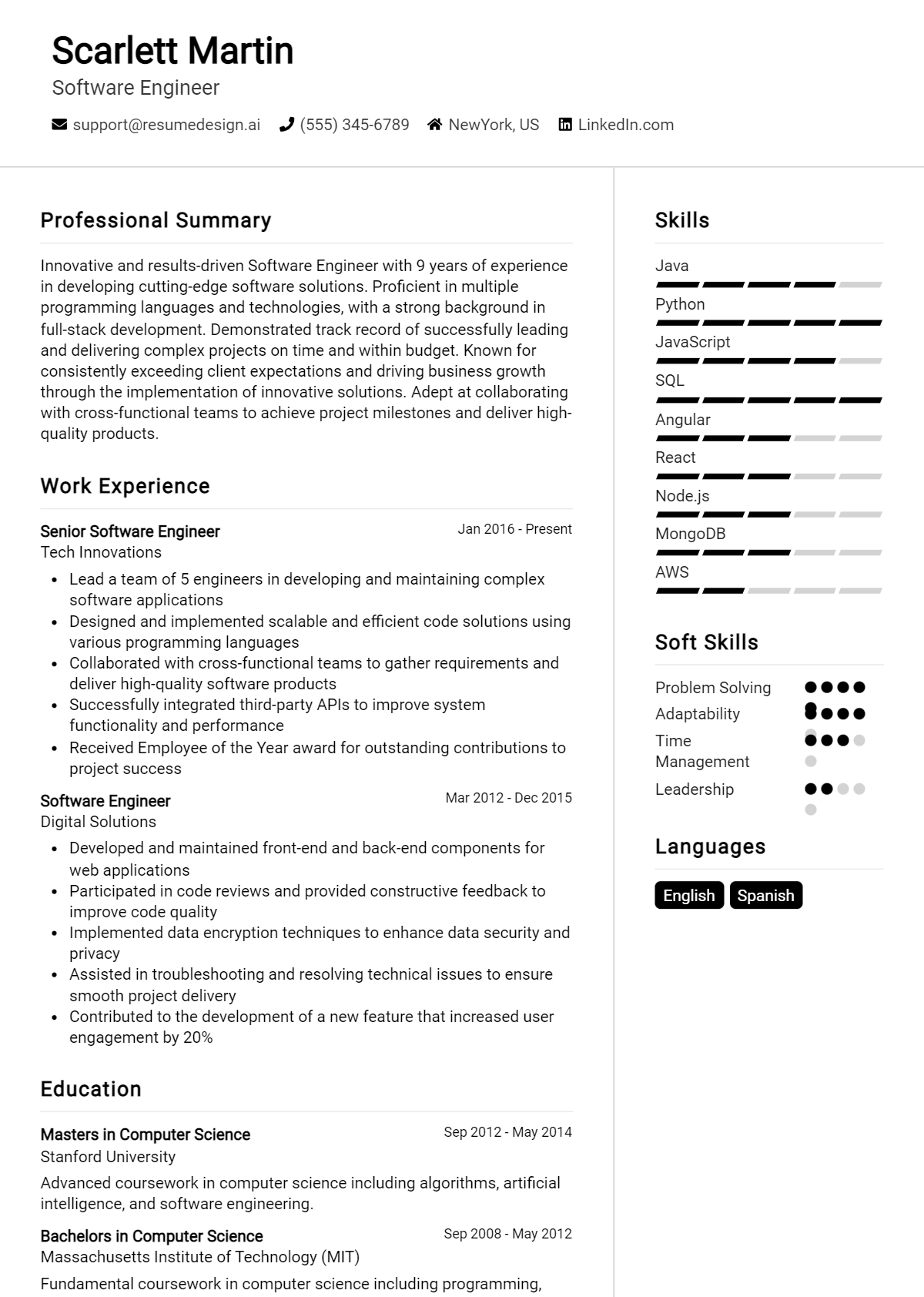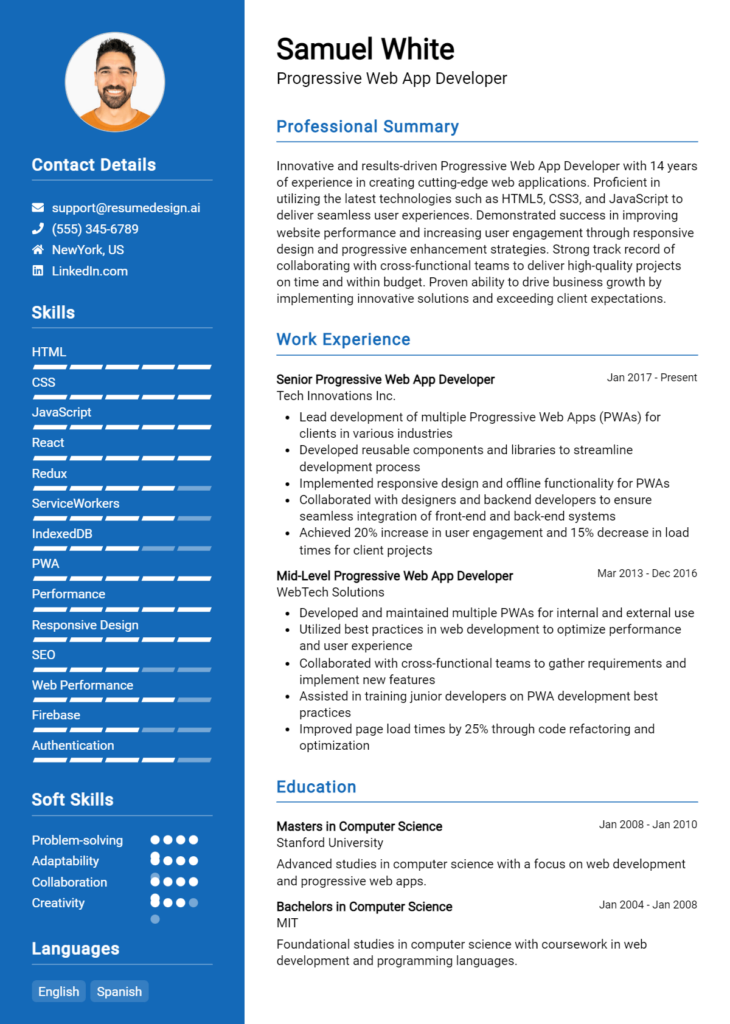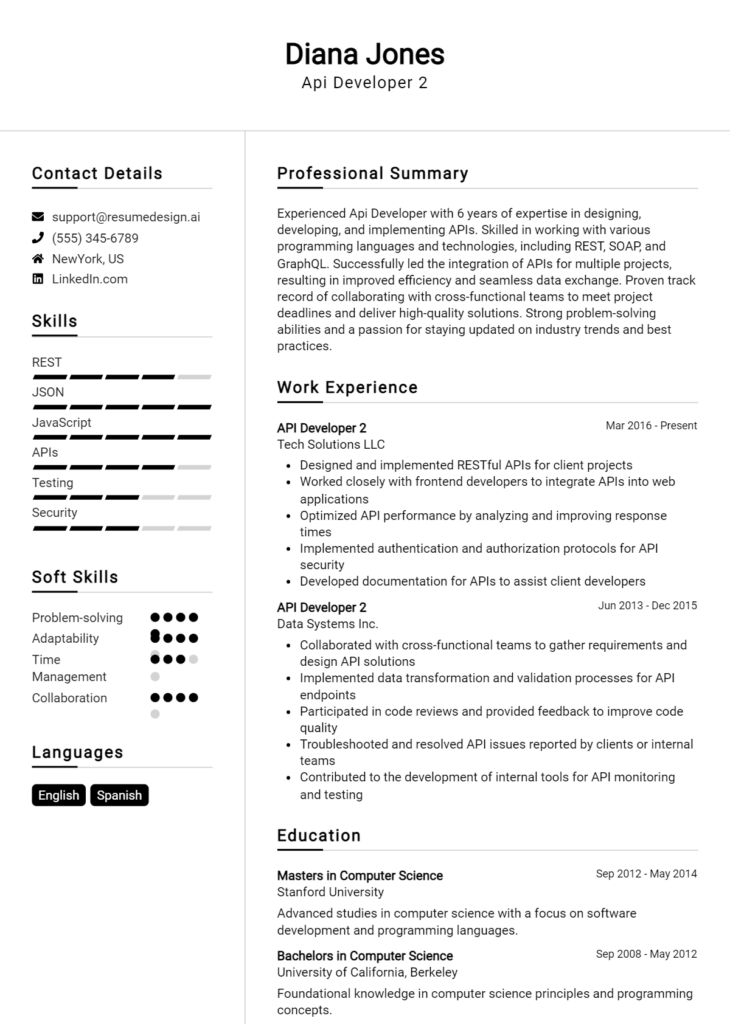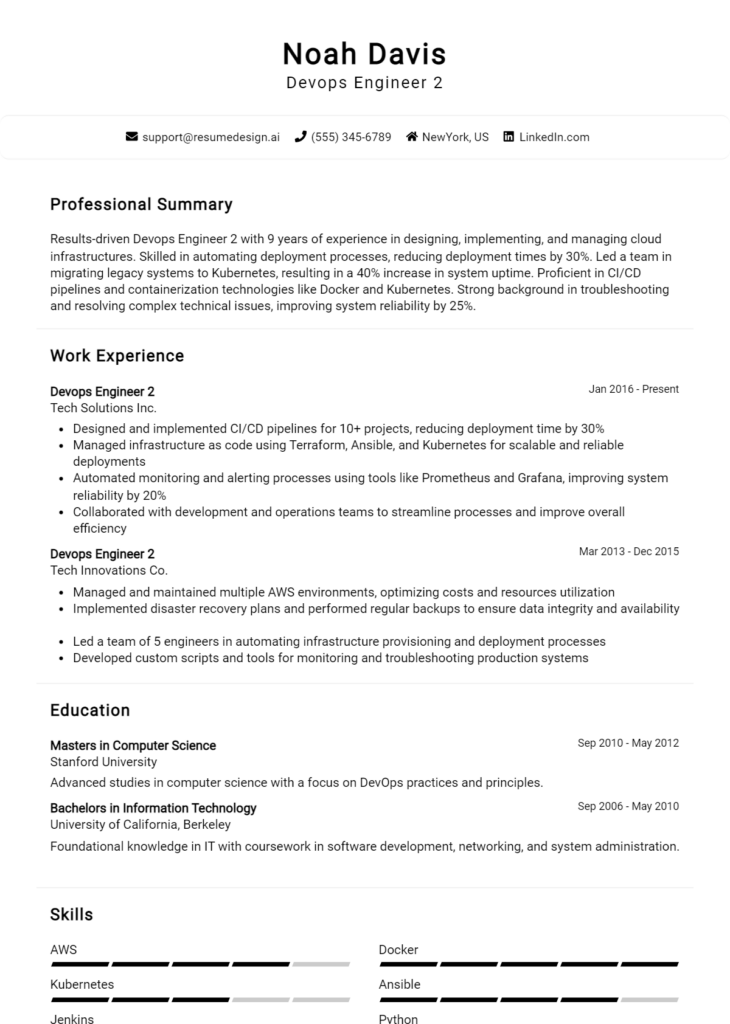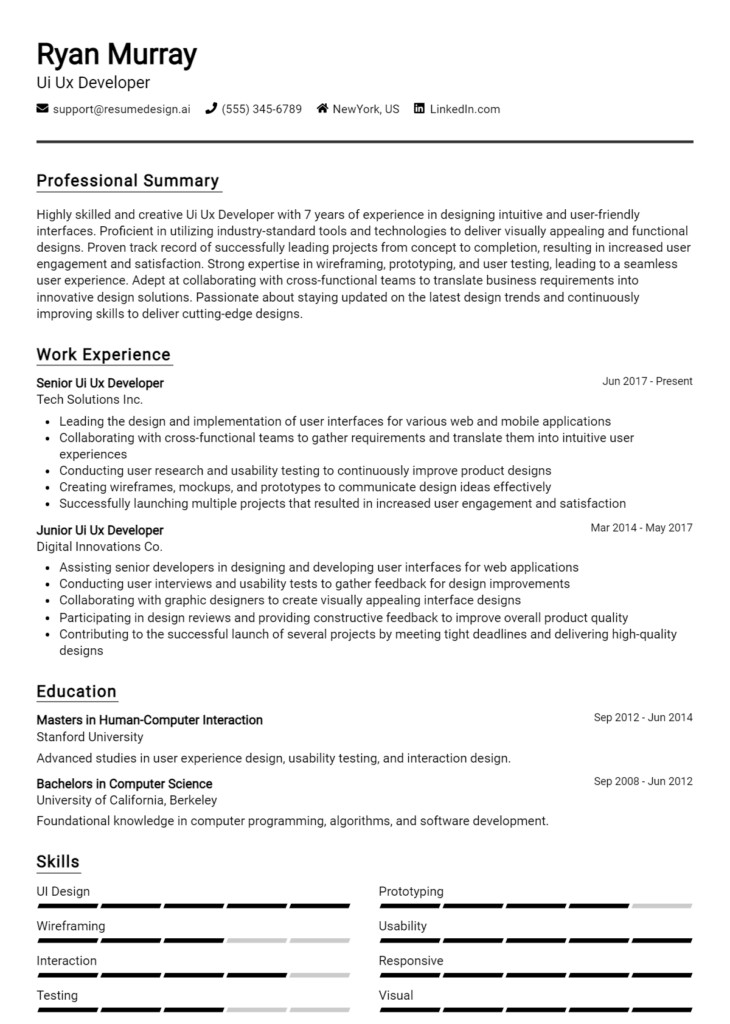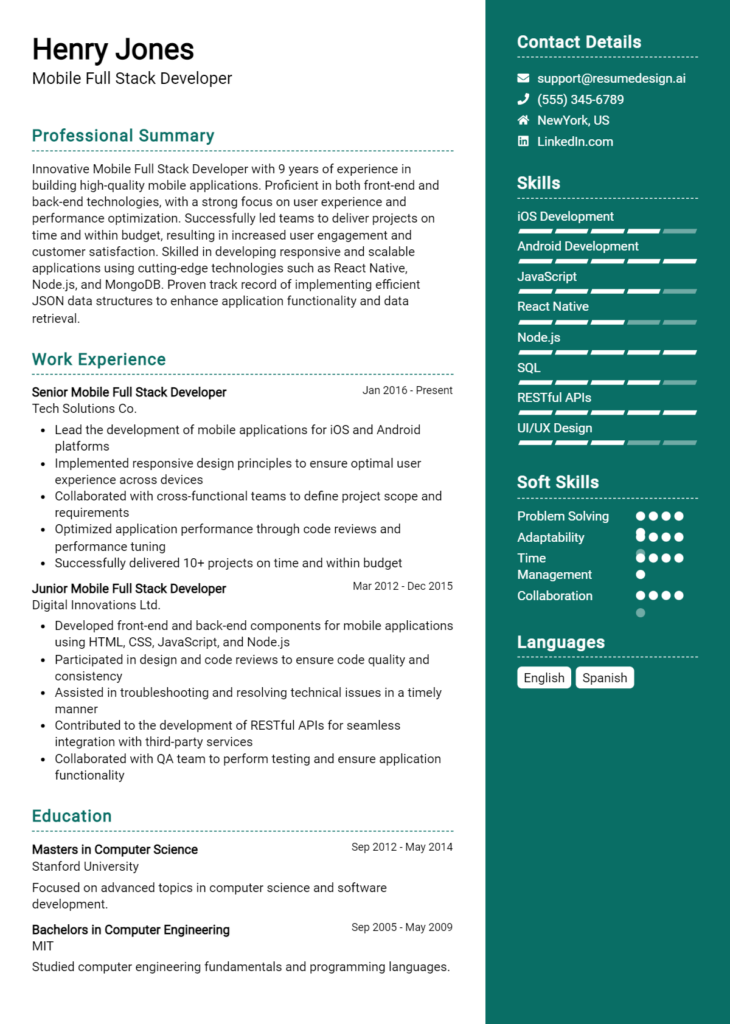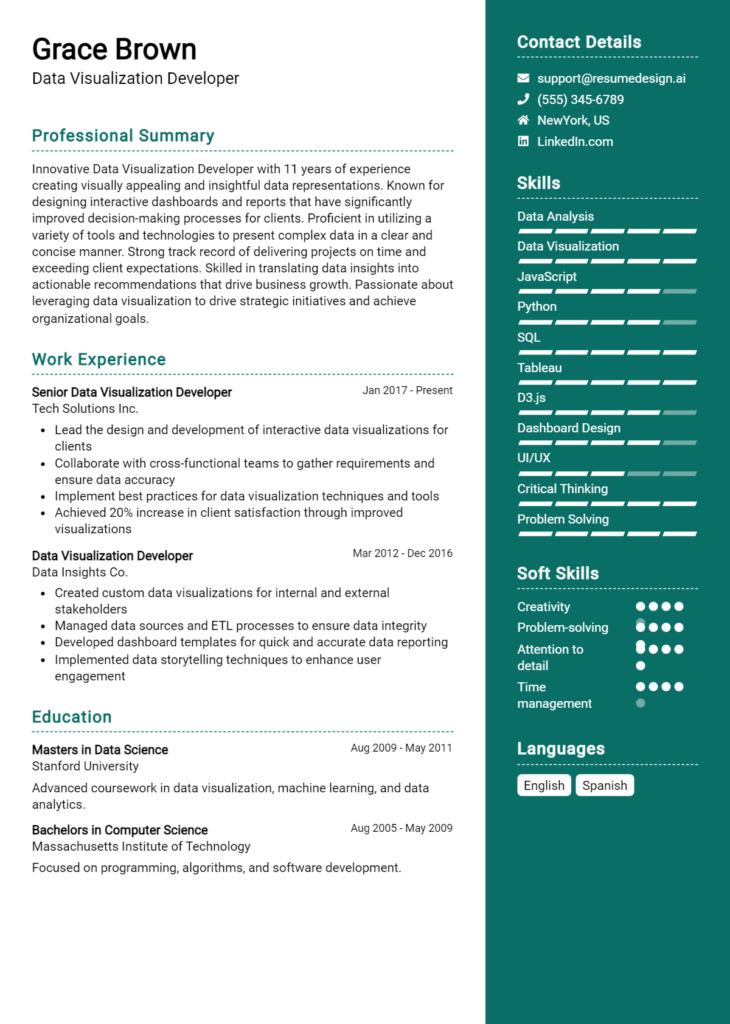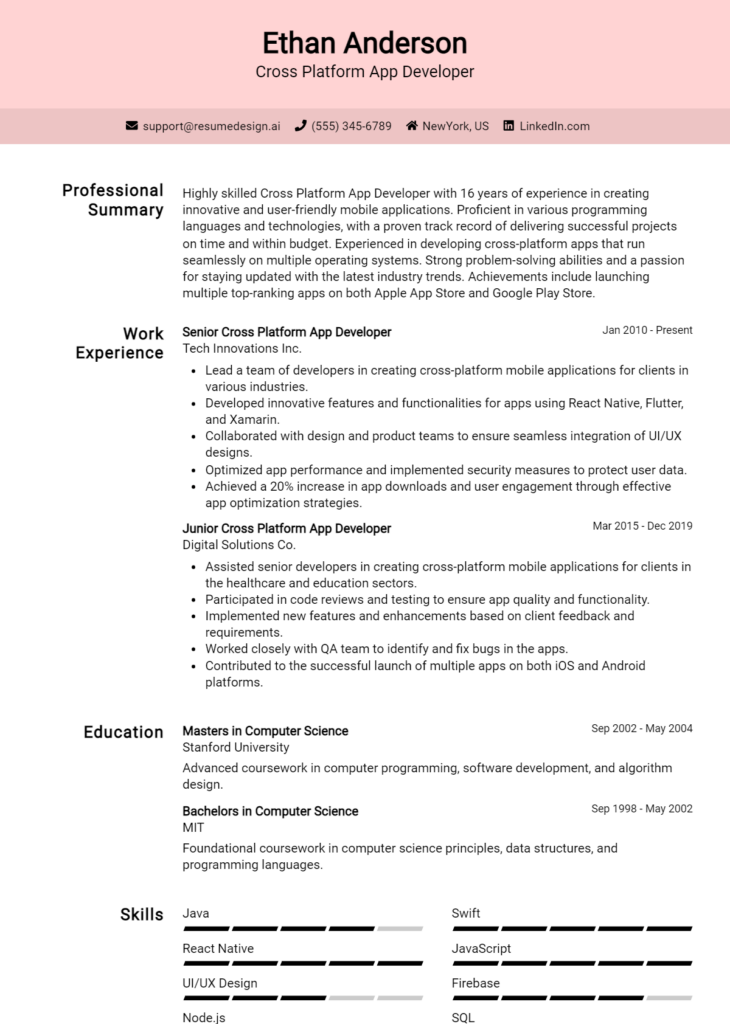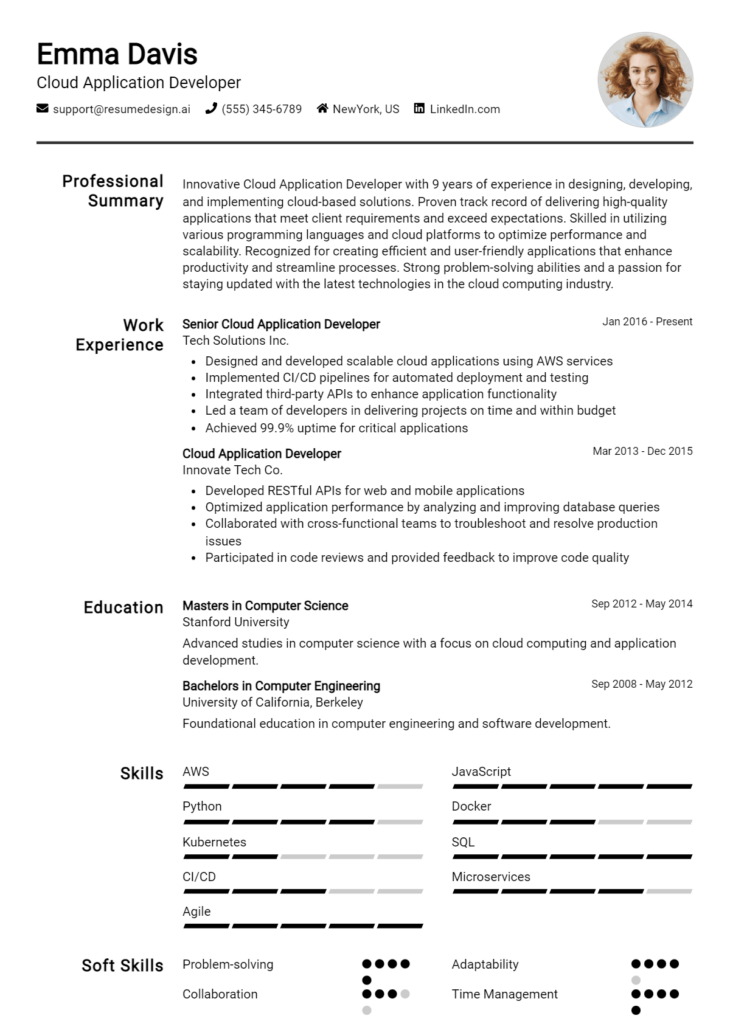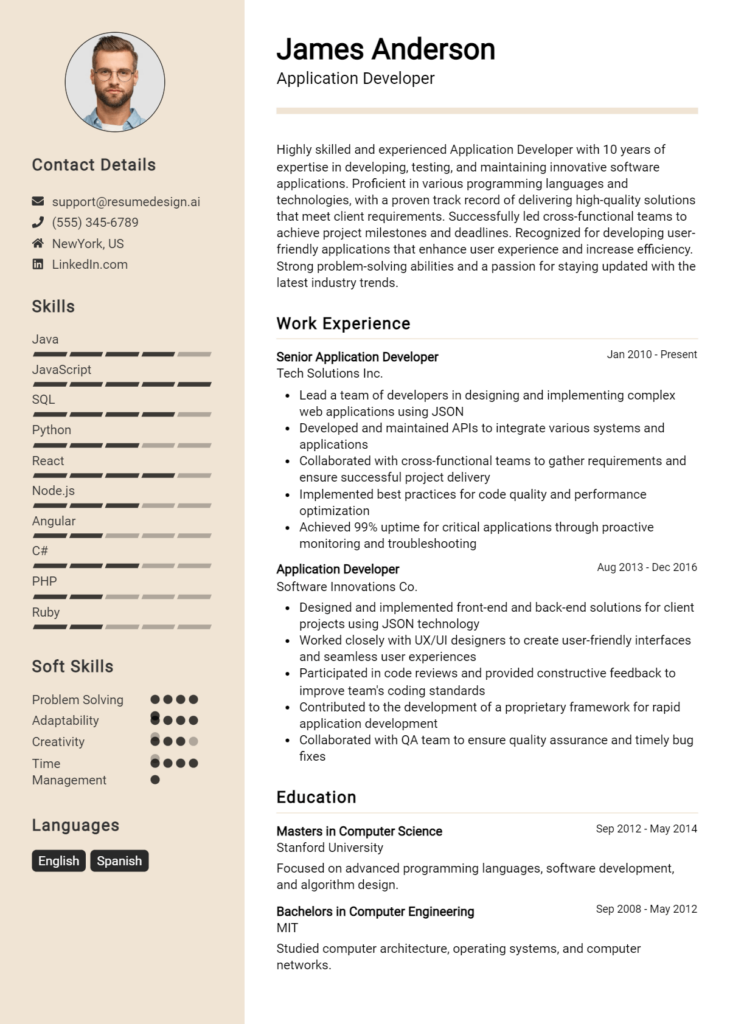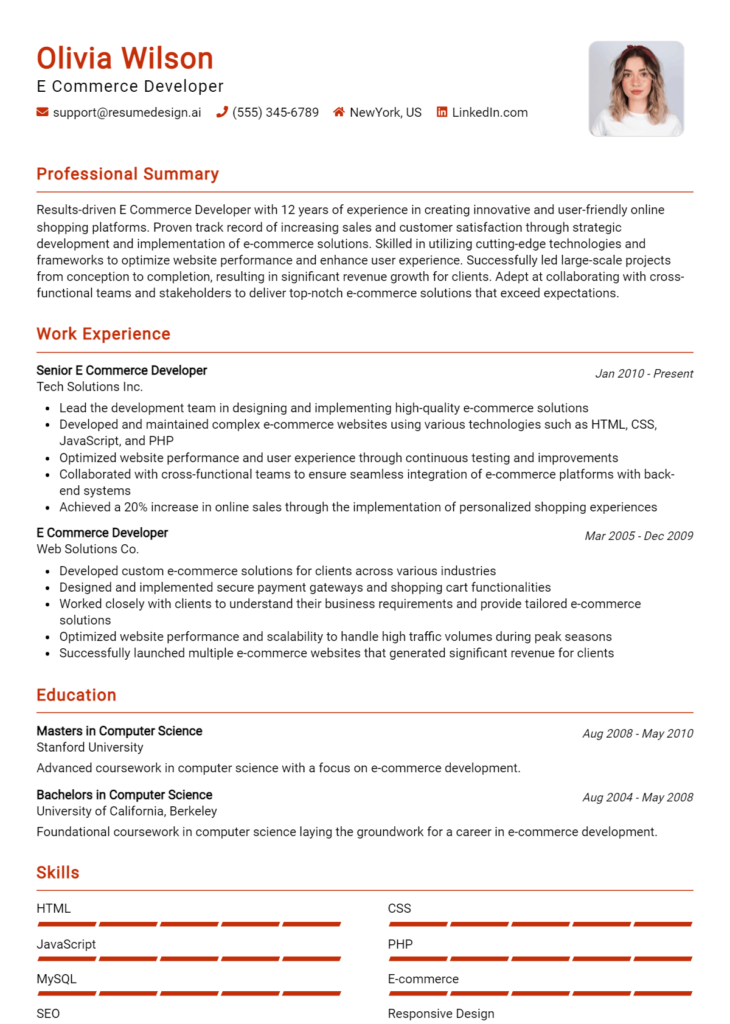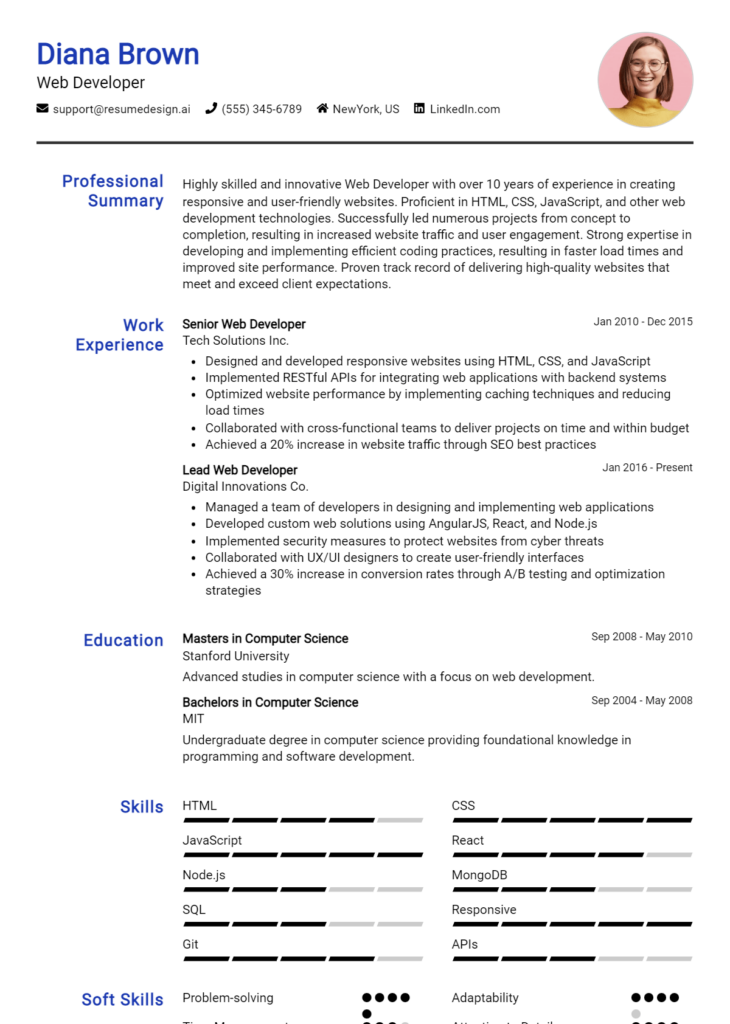Software Engineer Core Responsibilities
Software Engineers play a crucial role in creating, testing, and maintaining software applications that meet user needs and business objectives. They collaborate across departments, bridging the gap between technical teams and operational staff to ensure seamless functionality. Essential skills include strong programming, analytical thinking, and effective problem-solving abilities. These competencies are vital for aligning software solutions with organizational goals. A well-structured resume can effectively highlight these qualifications, showcasing a candidate's potential impact on the company.
Common Responsibilities Listed on Software Engineer Resume
- Designing, coding, and testing software applications.
- Collaborating with cross-functional teams to gather requirements.
- Debugging and troubleshooting software issues.
- Maintaining and improving existing software systems.
- Participating in code reviews and providing constructive feedback.
- Documenting software specifications and technical designs.
- Ensuring software security and compliance with standards.
- Staying updated with industry trends and technologies.
- Implementing automated testing and deployment processes.
- Contributing to agile development practices.
- Mentoring junior developers and sharing knowledge.
High-Level Resume Tips for Software Engineer Professionals
A well-crafted resume is essential for Software Engineer professionals as it serves as the first impression a candidate makes on potential employers. In a competitive job market, your resume must stand out by effectively showcasing your technical skills, relevant experience, and notable achievements. It is not merely a list of past jobs; it is a strategic marketing tool that must communicate your unique value proposition. This guide will provide practical and actionable resume tips specifically tailored for Software Engineer professionals, helping you to create a compelling document that opens doors to new opportunities.
Top Resume Tips for Software Engineer Professionals
- Tailor your resume to each job description by using keywords and phrases from the posting to demonstrate your fit for the role.
- Highlight relevant experience first, placing your most pertinent roles at the top of your employment history to catch the employer's attention.
- Quantify your achievements by using specific metrics, such as percentage improvements, lines of code written, or projects completed, to give context to your contributions.
- Showcase industry-specific skills, such as proficiency in programming languages (e.g., Python, Java, C++) and tools (e.g., Git, Docker) that are in demand for the position.
- Include personal projects or contributions to open-source software as they can demonstrate initiative and depth of knowledge beyond formal employment.
- Utilize a clean and professional layout that makes your resume easy to read, with clear headings and bullet points for quick scanning by hiring managers.
- Incorporate a summary statement at the top of your resume that succinctly describes your career goals and key qualifications.
- Proofread meticulously to avoid any spelling or grammatical errors that could detract from your professionalism.
- Consider including links to your GitHub, LinkedIn, or personal website to allow employers to further explore your work and professional presence.
By implementing these tips, you can significantly enhance your resume's effectiveness, increasing your chances of landing a job in the Software Engineer field. A well-structured resume that highlights your skills and accomplishments not only captures the attention of hiring managers but also positions you as a strong candidate ready to contribute to their team.
Why Resume Headlines & Titles are Important for Software Engineer
In the competitive landscape of software engineering, a resume headline or title serves as a powerful tool to capture the attention of hiring managers. A well-crafted headline can succinctly summarize a candidate's key qualifications, skills, and experiences, making an immediate impact in a crowded applicant pool. By clearly articulating their expertise in a few compelling words, candidates can differentiate themselves from others and set the tone for the rest of their resume. It is essential for the headline to be concise, relevant, and directly aligned with the job description to ensure that it resonates with potential employers.
Best Practices for Crafting Resume Headlines for Software Engineer
- Make it concise: Limit your headline to one impactful sentence or phrase.
- Be role-specific: Tailor your headline to the specific position you are applying for.
- Highlight key skills: Include relevant technical skills or programming languages that align with the job requirements.
- Showcase accomplishments: If applicable, mention notable achievements or significant projects.
- Use action verbs: Start with strong action words that convey expertise and initiative.
- Incorporate keywords: Use industry-specific keywords that align with the job description to pass through applicant tracking systems.
- Avoid clichés: Steer clear of overused phrases that don’t add value to your title.
- Keep it professional: Maintain a formal tone suitable for a professional resume.
Example Resume Headlines for Software Engineer
Strong Resume Headlines
Innovative Software Engineer Specializing in Full-Stack Development and Cloud Solutions
Results-Driven Software Developer with 5+ Years of Experience in Agile Environments
Expert JavaScript Developer with a Passion for Building Scalable Web Applications
Weak Resume Headlines
Software Engineer
Experienced Programmer
The strong headlines are effective because they provide specific information about the candidate's skills, experience, and achievements, which can immediately resonate with hiring managers looking for qualified applicants. They convey a clear value proposition and align closely with the requirements of the job. In contrast, the weak headlines lack specificity and fail to communicate any unique strengths or qualifications, making it difficult for hiring managers to discern the candidate's fit for the position at a glance. Generic titles do not capture interest and can easily be overlooked in a competitive job market.
Writing an Exceptional Software Engineer Resume Summary
A resume summary is a crucial component of a Software Engineer's resume, serving as a brief yet powerful introduction that highlights key skills, experience, and accomplishments relevant to the position. In today's competitive job market, hiring managers often review numerous applications, making it essential for candidates to quickly capture their attention. A well-crafted summary can set the tone for the rest of the resume, demonstrating the applicant's value and alignment with the job requirements. It should be concise, impactful, and tailored to the specific role, ensuring that the candidate stands out among a sea of resumes.
Best Practices for Writing a Software Engineer Resume Summary
- Quantify Achievements: Use numerical data to showcase your accomplishments, such as percentage increases in efficiency or successful project completions.
- Focus on Skills: Highlight technical skills relevant to the job, including programming languages, frameworks, and tools.
- Tailor the Summary: Customize your summary for each job application, aligning your experience with the specific job description.
- Use Action Verbs: Start sentences with strong action verbs to convey your contributions effectively.
- Showcase Relevant Experience: Emphasize work history that directly relates to the job you are applying for.
- Keep it Concise: Aim for 3-5 sentences that deliver a compelling snapshot of your qualifications.
- Be Impactful: Use descriptive language that conveys your passion for software engineering and your problem-solving abilities.
- Highlight Certifications: Mention any relevant certifications or educational qualifications that bolster your expertise in the field.
Example Software Engineer Resume Summaries
Strong Resume Summaries
Results-driven Software Engineer with over 5 years of experience in developing scalable web applications. Successfully led a team that increased application performance by 30% through innovative coding practices and agile methodologies.
Detail-oriented Full Stack Developer proficient in JavaScript, React, and Node.js, with a proven track record of delivering projects on time. Developed a customer-facing application that improved user engagement by 40% within the first three months of launch.
Accomplished Software Engineer with expertise in cloud computing and microservices architecture. Spearheaded a migration project that reduced operational costs by 25% and enhanced system reliability.
Weak Resume Summaries
Software Engineer with experience in coding. I like to work on interesting projects and solve problems.
Dedicated professional with a background in software development. I am looking for a challenging position where I can use my skills.
The strong resume summaries stand out because they provide specific, quantifiable achievements and directly relate to the skills and experiences sought by employers. They clearly articulate the candidate's contributions and demonstrate how they can add value to a prospective employer. In contrast, the weak summaries are vague, lacking detail and measurable outcomes, making it difficult for hiring managers to gauge the candidate's capabilities or relevance to the role.
Work Experience Section for Software Engineer Resume
The work experience section of a Software Engineer resume is critical as it serves as a direct reflection of the candidate's technical capabilities, project management skills, and their ability to deliver high-quality software products. This section allows candidates to showcase their proficiency with various programming languages, tools, and technologies, while also highlighting their experience in leading teams, collaborating with stakeholders, and achieving measurable results. Quantifying achievements, such as improved performance metrics or successful project completions, and aligning this experience with industry standards significantly enhances a candidate's appeal to potential employers.
Best Practices for Software Engineer Work Experience
- Use specific metrics to quantify achievements, such as percentage improvements or time saved.
- Highlight relevant technical skills used in each position to demonstrate expertise.
- Detail leadership roles or team collaboration efforts to showcase management capabilities.
- Focus on outcomes and the impact of your work on the organization or project.
- Tailor your work experience to align with the job description and industry standards.
- Use action verbs to convey your contributions effectively and dynamically.
- Maintain clarity and conciseness to keep the reader engaged.
- Include a variety of experiences, from internships to full-time roles, to demonstrate growth.
Example Work Experiences for Software Engineer
Strong Experiences
- Led a team of 5 engineers to develop a web application that increased user engagement by 40%, resulting in a 25% boost in sales over six months.
- Implemented an automated testing framework that reduced bug detection time by 30%, significantly improving software reliability before deployment.
- Collaborated with cross-functional teams to design and launch a mobile application, achieving over 10,000 downloads within the first month.
- Optimized existing codebase, resulting in a 50% decrease in page load times, enhancing user experience and site retention rates.
Weak Experiences
- Worked on various projects with little detail on outcomes or technologies used.
- Participated in team meetings and discussions.
- Helped with software development tasks.
- Responsible for coding and debugging software.
The examples in the "Strong Experiences" section are considered effective because they provide specific metrics, highlight leadership roles, and demonstrate the candidate's direct contributions to successful outcomes. In contrast, the "Weak Experiences" lack detail and quantifiable results, making them less compelling and failing to communicate the candidate's true capabilities or impact within their roles.
Education and Certifications Section for Software Engineer Resume
The education and certifications section of a Software Engineer resume is vital as it showcases the candidate's academic achievements, relevant certifications, and commitment to continuous professional development. This section provides potential employers with insights into the candidate's foundational knowledge and specialized skills that are essential for success in the software engineering field. By including relevant coursework, industry-recognized certifications, and specialized training programs, candidates can significantly enhance their credibility and demonstrate their alignment with the specific requirements of the job role.
Best Practices for Software Engineer Education and Certifications
- Include only relevant degrees and certifications that pertain to the software engineering field.
- Provide specific details about coursework that aligns with the job description to demonstrate applicable knowledge.
- Highlight advanced certifications from reputable organizations, such as AWS, Microsoft, or Google.
- Use clear formatting to differentiate between degrees, certifications, and specialized training.
- List certifications in order of relevance, placing the most pertinent ones at the top of the section.
- Include dates of completion for certifications to show ongoing professional development.
- Consider including any honors or distinctions received during your education to further enhance your credibility.
- Be concise but thorough; ensure the section is not overly cluttered with excessive detail.
Example Education and Certifications for Software Engineer
Strong Examples
- Bachelor of Science in Computer Science, University of Technology, 2020
- Certified Kubernetes Administrator (CKA), 2022
- AWS Certified Solutions Architect – Associate, 2021
- Relevant Coursework: Data Structures and Algorithms, Software Engineering Principles, Web Development
Weak Examples
- Associate Degree in General Studies, Community College, 2018
- Microsoft Office Specialist Certification, 2019
- Basic HTML Course, Online Platform, 2020
- High School Diploma, Anytown High School, 2016
The examples provided illustrate the difference between strong and weak qualifications. Strong examples demonstrate a direct relevance to software engineering through specialized degrees and certifications, showcasing advanced skills and knowledge that prospective employers seek. In contrast, weak examples highlight qualifications that are either too general or outdated, lacking the industry-specific focus that would benefit the candidate's application. This distinction is crucial for candidates to understand as they tailor their resumes to meet the demands of the software engineering job market.
Top Skills & Keywords for Software Engineer Resume
A well-crafted resume is essential for a Software Engineer, as it acts as the first point of contact between candidates and potential employers. Highlighting the right skills is crucial, as it allows candidates to showcase their technical expertise and problem-solving abilities, setting them apart in a competitive job market. Including both hard and soft skills on a resume can effectively demonstrate a candidate's qualifications and readiness for the role. For those looking to enhance their resumes, understanding the difference between these two types of skills is vital. Hard skills reflect specific technical knowledge and abilities, while soft skills encompass interpersonal attributes that contribute to teamwork and communication.
Top Hard & Soft Skills for Software Engineer
Hard Skills
- Proficiency in programming languages (e.g., Python, Java, C++)
- Experience with version control systems (e.g., Git)
- Knowledge of software development methodologies (e.g., Agile, Scrum)
- Familiarity with databases (e.g., SQL, NoSQL)
- Understanding of cloud computing platforms (e.g., AWS, Azure)
- Experience with front-end technologies (e.g., HTML, CSS, JavaScript)
- Ability to write efficient algorithms and data structures
- Proficiency in mobile app development (e.g., Android, iOS)
- Knowledge of DevOps practices
- Experience with automated testing frameworks
- Familiarity with API design and development
- Understanding of cybersecurity principles
- Ability to work with containerization tools (e.g., Docker)
- Proficiency in debugging and troubleshooting software issues
- Knowledge of web development frameworks (e.g., React, Angular, Vue.js)
- Experience with machine learning libraries (e.g., TensorFlow, PyTorch)
- Familiarity with integrated development environments (IDEs)
- Understanding of microservices architecture
Soft Skills
- Strong problem-solving abilities
- Excellent communication skills
- Team collaboration and interpersonal skills
- Adaptability to changing technologies
- Time management and organizational skills
- Critical thinking and analytical skills
- Attention to detail
- Initiative and self-motivation
- Creativity and innovation
- Ability to work under pressure
- Strong work ethic
- Willingness to learn and grow
- Empathy and emotional intelligence
- Conflict resolution skills
- Leadership qualities
- Networking and relationship-building skills
- Open-mindedness and receptiveness to feedback
Highlighting the right skills along with relevant work experience can significantly enhance a Software Engineer's resume, making it more appealing to potential employers.
Stand Out with a Winning Software Engineer Cover Letter
I am writing to express my interest in the Software Engineer position at [Company Name], as advertised on [Job Board/Company Website]. With a Bachelor’s degree in Computer Science and over three years of experience in developing efficient software solutions, I am confident in my ability to contribute effectively to your team. My background in both front-end and back-end development, coupled with a passion for solving complex problems, makes me a strong candidate for this role.
In my previous role at [Previous Company Name], I successfully led a project that involved creating a user-friendly web application, which resulted in a 30% increase in user engagement. I utilized technologies such as JavaScript, React, and Node.js to build scalable and responsive applications. My ability to collaborate with cross-functional teams allowed us to streamline the development process, ultimately delivering the project ahead of schedule. Additionally, my experience with cloud platforms like AWS enhances my capability to build and deploy applications that meet modern demands for scalability and reliability.
What excites me about the opportunity at [Company Name] is your commitment to innovation and quality. I am particularly drawn to [specific project or value of the company], and I believe my skills in agile development methodologies and continuous integration practices would be an asset. I am eager to bring my technical skills and creative problem-solving abilities to your team, ensuring that we not only meet project goals but also exceed user expectations.
Thank you for considering my application. I am looking forward to the possibility of discussing how my experience and vision align with the goals of [Company Name]. I am excited about the prospect of contributing to your team and am available for an interview at your earliest convenience.
Common Mistakes to Avoid in a Software Engineer Resume
A well-crafted resume is crucial for a Software Engineer seeking to stand out in a competitive job market. However, many candidates inadvertently make common mistakes that can undermine their chances of landing an interview. Understanding these pitfalls can help job seekers present their skills and experiences more effectively. Here are some frequent mistakes to avoid when creating a Software Engineer resume:
Vague Descriptions: Using generic phrases like "responsible for" instead of specific actions can diminish the impact of your accomplishments. Clearly articulate what you did and the results achieved.
Overloading with Technical Jargon: While it's important to highlight technical skills, excessive jargon can confuse hiring managers. Aim for a balance that showcases your expertise without alienating non-technical reviewers.
Ignoring Keywords: Many companies use Applicant Tracking Systems (ATS) to filter resumes. Failing to include relevant keywords from the job description can lead to your resume being overlooked.
Lack of Quantifiable Achievements: Instead of simply listing duties, include quantifiable results (e.g., "Reduced loading time by 30%") to demonstrate the tangible impact of your work.
Formatting Issues: An unorganized or cluttered layout can make it difficult for recruiters to read your resume. Use clear headings, bullet points, and consistent fonts to enhance readability.
Omitting Soft Skills: Technical prowess is essential, but soft skills like teamwork, communication, and problem-solving are equally important. Highlight these skills with examples to show your well-rounded capabilities.
Not Tailoring the Resume: Sending the same resume to multiple employers can be detrimental. Tailor your resume for each application to align your skills and experiences with the specific role and company culture.
Neglecting to Proofread: Spelling and grammatical errors can create an unprofessional impression. Always proofread your resume multiple times or have someone else review it before submission.
Conclusion
As we wrap up our discussion on the essential components of a successful Software Engineer resume, it's crucial to remember that your resume is often the first impression you make on potential employers. Key points covered include the importance of showcasing relevant technical skills, highlighting project experiences, and tailoring your resume to match the specific job description. Additionally, we emphasized the value of including metrics to demonstrate your impact in previous roles.
Now is the perfect time to take a closer look at your own Software Engineer resume. Are you effectively communicating your skills and experiences? Are you using the right format to catch the eye of hiring managers? If you're unsure, don't worry! There are plenty of resources available to help you enhance your resume.
Consider utilizing resume templates to give your document a professional layout, or try out a resume builder for an easy, guided experience in creating your resume. You can also explore resume examples for inspiration and ideas on how to present your qualifications effectively. Lastly, don't overlook the importance of a strong cover letter—check out our cover letter templates to make sure you make a compelling case for your candidacy.
Take action today—review your Software Engineer resume and make the necessary updates to stand out in the competitive job market!

